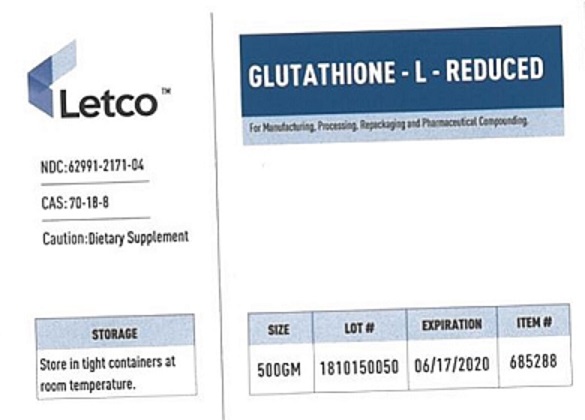FDA highlights concerns with using dietary ingredient glutathione to compound sterile injectables
Compounding Alert: June 7, 2019
Introduction
FDA warned compounders on February 1, 2019, not to use glutathione L-reduced powder (L-glutathione) distributed by Letco Medical located in Decatur, Alabama, to compound sterile injectable drugs. FDA received a report concerning seven patients who received an injectable drug compounded with L-glutathione and experienced adverse events due to potentially high levels of endotoxins, a substance that may cause unintended health consequences ranging from fever to death. Exposure to inappropriate levels of endotoxin in a drug intended for injection raises safety concerns. As part of the investigation into the adverse events, FDA collected and analyzed samples of the L-glutathione powder. The following are the details on the adverse events the agency has received to date and the findings from FDA’s investigation.
Adverse Events
FDA received an adverse event report on January 14, 2019, regarding seven patients in an outpatient clinic who received intravenous injections containing L-glutathione 200mg/mL compounded by a pharmacy using L-glutathione repackaged by Letco (lot number: 1810150050, expiration date: 6/17/2020). According to the report, each patient was administered 7mL (1,400mg) of L-glutathione by injection on January 9, 2019. Within minutes of the infusion, the patients reportedly experienced symptoms of varying degrees, including nausea, vomiting, lightheadedness, chills, body aches and sneezing. One of the patients experienced low blood pressure and difficulty breathing and was subsequently transferred to a hospital.
FDA received another adverse event report on February 4, 2019, associated with an intravenous injection of a drug containing L-glutathione 200mg/mL compounded by a different pharmacy that also used L-glutathione repackaged by Letco (lot number: 1808030045, expiration date: 6/17/2020). According to the report, the patient received an infusion of 12mL (2,400mg) of L-glutathione on October 17, 2018, and experienced sudden chills, fever and shaking, and was subsequently admitted to the hospital for a possible bloodstream infection.
FDA’s Investigation
The L-glutathione in question was sourced from a foreign manufacturer and repackaged by Letco, an FDA registered repackager. Letco’s L-glutathione label included the statements: “Caution: Dietary Supplement” and “For Manufacturing, Processing, Repackaging and Pharmaceutical Compounding,” and the NDC number, 62991-2171-04 (see Figure 1). Further, Letco’s certificate of analysis (COA) that accompanied the L-glutathione was a translated copy of the manufacturer’s COA.
FDA contacted the L-glutathione manufacturer, which confirmed that its L-glutathione is only marketed in the U.S. for use in dietary supplements, and that the ingredient is not intended for use in sterile drugs. The manufacturer’s original invoice for the L-glutathione contained a statement that the product was intended for use as a dietary supplement or dietary ingredient only, and that it was not for pharmaceutical use. However, the manufacturer’s COA that Letco received, did not contain a similar statement.
Upon FDA’s recommendation, the manufacturer agreed to amend the L-glutathione label and COA to include clear statements regarding the intended use of this ingredient. The manufacturer also notified its U.S. customers warning against the use of its L-glutathione in sterile drugs.
FDA Analysis
Accompanying the initial adverse event reports were endotoxin test results from a third-party laboratory, which FDA found concerning. FDA then collected L-glutathione powder samples from Letco and from the pharmacy that compounded the drug associated with the seven adverse events. All samples tested by an FDA laboratory were found to contain excessive bacterial endotoxin with some results as high as five times the appropriate limit, which the agency calculated based on the L-glutathione dose received by the patients.1 Endotoxin limits should be calculated using the maximum drug dose intended for intravenous (IV) administration. Symptoms associated with exposure to inappropriate endotoxin levels may include fever, chills, myalgia (muscle pain), headache, nausea, vomiting, hypotension (low blood pressure), shock and death.2, 3
Conclusion
These adverse events were consistent with reactions patients experience with excessive levels of endotoxin, and FDA’s testing confirmed higher levels of endotoxin than is appropriate based on the dose of L-glutathione received intravenously. The L-glutathione powder the pharmacies received was labeled with “Caution: Dietary Supplement” and should not have been used to compound sterile injectable drugs. Ingredients not intended for use in compounding sterile injectable drugs can be harmful when administered to patients because they may contain impurities and contaminants, including endotoxins.
It is critical that compounders understand that quality should be built into the drug production, and that testing alone should not be relied on to ensure drug quality. Therefore, compounders should ensure that all ingredients they use to produce sterile injectable drugs are manufactured under conditions and specifications appropriate for the intended route of administration.
FDA also urges manufacturers and repackagers to clearly label ingredients intended for use in dietary supplements. Additionally, repackagers should ask the manufacturer about the intended use of the ingredient. Clarifying information on ingredient labels and in the COA could help prevent compounders from using ingredients not appropriate for sterile injectable drugs.
FDA encourages consumers, patients and health care professionals to report any adverse events or quality problems experienced with the use of compounded drug products to FDA’s MedWatch Adverse Event Reporting program:
- Complete and submit the report online at Medwatch; or
- Download and complete the form, then submit it via fax at 1-800-FDA-0178.
References
- See USP General Chapter <85> Bacterial Endotoxins Test for more information.
- MMWR Morb Mortal Wkly Rep. 1998 Oct 23;47(41):877-80.
- Krieger JA and Duncan L. Gentamicin Contaminated with Endotoxin. The New England Journal of Medicine. 1999 Apr; 340(14):1122.


